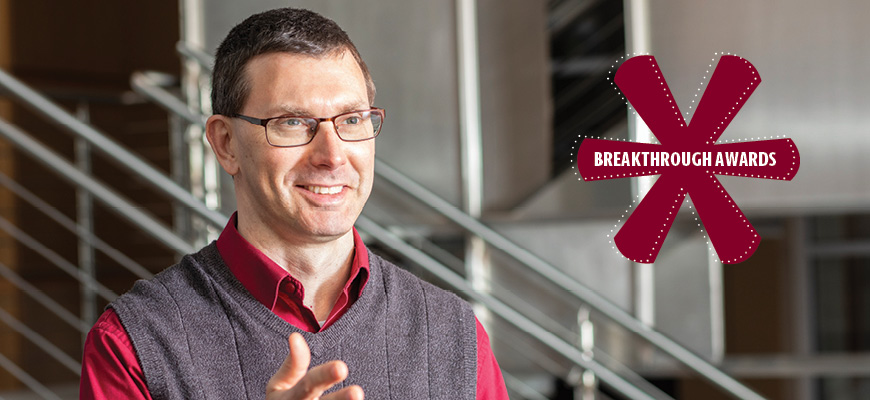
Breakthrough Leader: Travis Knight
Nuclear engineering professor puts UofSC program on the map
Posted on: May 25, 2020; Updated on: May 25, 2020
By Megan Sexton, [email protected], 803-777-1421
Travis Knight grew up in a small town in a rural section of Florida, where his father worked in a sawmill and his grandfather was a preacher. No one in his family had ever gone to college.
He was fortunate, he says, to have science teachers in high school who inspired and encouraged him. That’s what led him to study nuclear engineering at the University of Florida, where he found mentors on the faculty and learned about the diverse opportunities in the field. It eventually led him to become a professor and a founding member of the nuclear engineering program at the University of South Carolina, where he has built an extensive laboratory to develop and test advanced nuclear fuels and another lab for evaluation and testing of used fuel for storage and transportation.
He also has developed a reputation as a mentor and supportive colleague, encouraging both students and fellow faculty members to pursue careers and research in nuclear engineering. He has graduated seven doctoral students and engaged with faculty members who might not otherwise know about opportunities in nuclear fields.
“I think anything that puts us on a larger stage in the nuclear arena is good for the program and good for the university,” Knight says. “So stimulating interest in nuclear science among the students and faculty here has been part of my mission.”
In addition to his own research, he has supported faculty members formally, as a co-PI, or informally by advising and contributing in key technical areas. He also makes his lab available for tests involving nuclear material when needed.
“I’ve sought to engage with other faculty in mechanical engineering and outside my department; to be supportive of folks who might not otherwise know about opportunities in nuclear. They have skill sets and techniques that would work well when applied to nuclear engineering opportunities,” he says.
I think anything that puts us on a larger stage in the nuclear arena is good for the program and good for the university. So stimulating interest in nuclear science among the students and faculty here has been part of my mission.
Travis Knight, nuclear engineering professor
He also has represented the university on the Southeast Universities Nuclear Reactors Institute for Science and Education (SUNRISE) board of directors. In that role, he has been a leader in developing collaborative proposals for the design of next generation nuclear research facilities.
When Knight arrived at the university in 2004, most of his work was focused on advanced nuclear fuels, with space nuclear fuels and power and advanced reactors. More recently, his work has centered on the back end of fuel cycle work, researching new ways to handle and use spent nuclear fuel.
“In the last four to five years, things have taken off in that area. In my lab, we have the ability to work with radioactive materials,” he says. “We work with the confluence of vacuum, heating, high temperatures — all these things. I got into this work to study what to do with spent nuclear fuel. One day, we’re going to want to recycle it.”
Growing the number of nuclear engineers is especially important today, Knight says, as large percentages of those working in the Department of Energy and the nuclear industry will soon be eligible for retirement.
“We need to maintain our leadership not only for energy, although a low-carbon source such as nuclear energy is important. You only need to read the headlines to know the genie is out of the bottle,” Knight says. “We need to be a leader and maintain leadership so we know what everybody else is doing and not doing. If we’re not leaders then somebody else will be.
“We’re not doing classified work here, but we are training quality students in fundamentals and cutting-edge science so they can contribute in that area. Most of our students go into energy and related work. There are strategic reasons to want high-qualified people in the nuclear world.”